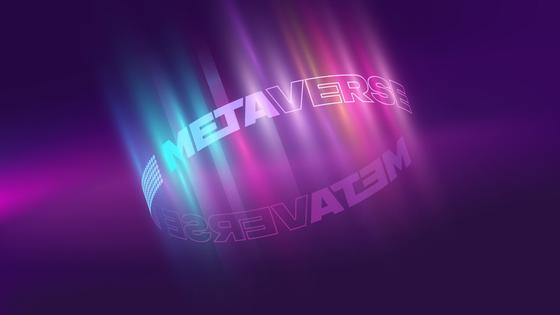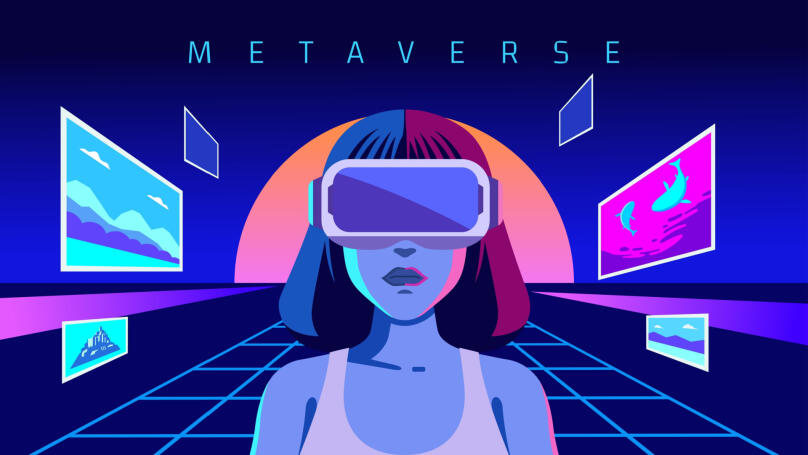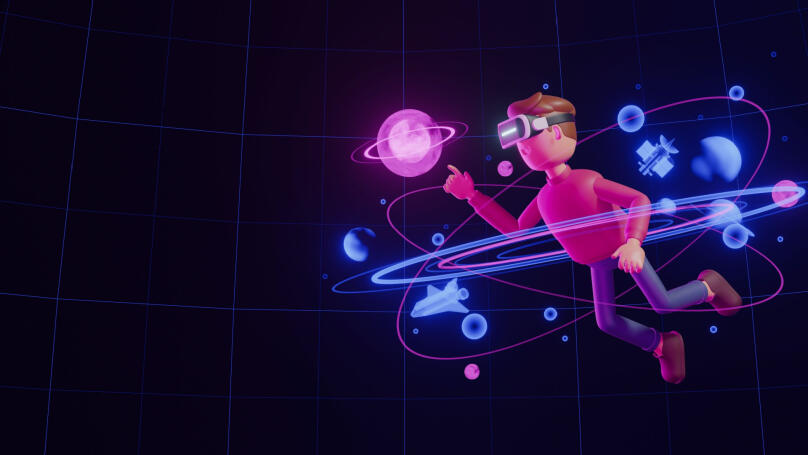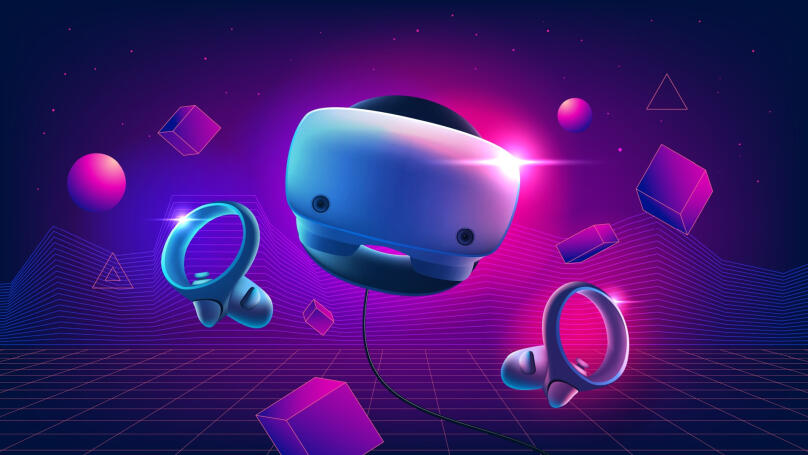Lectera's innovative new product: discover virtual opportunities with us!
Lectera starts the new year 2024 by presenting a unique course, "Metaverse for All: Dive into the Digital Realm"! It is devoted to the metaverse, one of today's most cutting-edge and groundbreaking digital...

Lectera starts the new year 2024 by presenting a unique course, "Metaverse for All: Dive into the Digital Realm"! It is devoted to the metaverse, one of today's most cutting-edge and groundbreaking digital technologies.
This course allows you to immerse yourself in this virtual world, discover the metaverse, and gauge its abilities and opportunities. As you learn, you will find the different types of metaverses that exist, how many there are, and who is behind them. You will also discover practical lessons on creating and customising an avatar, mastering applications for working and living in the virtual world and learning about instances of digital technology being used successfully in various areas of human activity. If you are not afraid to look into the future, then the new Lectera course is tailored especially for you! To help you better understand what to expect and what will be discussed throughout the course, we have prepared an article about the emergence and development of metaverses.
The mystery of the metaverse: who are its inhabitants, and how do you get there?
With the advent of the digitalisation era, the entire world has gone digital. People find professions and work, spend their free time, make new acquaintances, communicate, and even build families in the digital realm. The so-called metaverse, a combination of virtual reality and everyday life, is expected to attract a quarter of the world's population over the next few years. According to research by the American company Gartner, users will spend several hours daily in the metaverse. Currently, active users are already visiting virtual offices and stores. Shortly, they will be able to construct houses and buy land in this digital space. Let's find out in greater detail how the metaverse operates, who invented it, and how to access this alternative reality.
What is the Metaverse, and how did it come into existence?

The metaverse is an artificially created online space that combines physical, augmented, and virtual reality. Users connect to this universe through avatars and perform activities similar to what they normally do in real life.
It's fascinating that, for the first time, it was not the world's IT giants and corporations who thought about the possibility of creating a metaverse but science fiction writers. At the end of the last century, specifically in 1992, the prototype of the current metaverse and the first mention of the term itself first appeared in the book "Snow Crash" by American author Neal Stephenson. According to his theory, the metaverse is the next stage in developing the Internet. In his science fiction novel, the author described a near future where humanity lives in two dimensions - the real one, immersed in chaos, and the virtual one. These worlds exist in parallel as well as separately, while also being able to influence and change each other. For example, in his ordinary life, the main character, Hiro, is just a pizza delivery guy. Still, he immediately becomes an excellent hacker when he puts on a special headset, glasses, or any other device that he can use for being in cyberspace. Therefore, the metaverse fuses physical reality and the virtual world.
Later, many other science fiction works expressed similar ideas about constructing a metaverse. For example, Ernest Cline's novel "Ready Player One", published in 2011, develops the theme of a massive and growing online space.
The development of metaverses and the first real prototype
The first physical metaverse, not only as an idea on the pages of science fiction novels, appeared in 2003. Then, the American technology company Linden Lab launched the "Second Life" platform. It was one of the first 3D virtual universes with elements of social interaction and freedom of movement. In this virtual world, users could create their characters, known as avatars, and interact with others in the same universe. Users could join clubs based on similar interests, create their products and works of art, design and build houses, and travel through the sights of a fictional world. By the way, Second Life is still popular; there are over a million active users still in its universe.
The application's popularity contributed to the growing interest in combining real-life and virtual space. During the COVID-19 pandemic and the subsequent quarantine measures, there was an urgent need for interpersonal communication devoid of physical contact. Therefore, various means of virtual communication began to develop more actively. However, it is only recently that people have started to talk about metaverses and the creation of fully developed virtual worlds.
In 2021, Mark Zuckerberg announced his goal to create his own metaverse, renamed the company Meta, and released the first online game equipped with virtual reality technology, Horizon Worlds, and special devices for modelling three-dimensional spaces, such as VR headsets and glasses. We can say that the entrepreneur's initiative made the term "metaverse" go viral again, becoming fashionable and one of the most discussed topics of conversation.
In addition to Meta, other IT businesses, including real giants like Google and numerous startups, are also developing metaverses. Hence, the American computer game company Epic Games is also working on its digital world. Likewise, Microsoft is also developing a project for an independent metaverse. According to Satya Nadella, the head of the corporation, the virtual world will be built based on the Azure cloud platform. Furthermore, Microsoft has already presented the Mesh application for working and communicating in mixed reality. The platform enables you to create virtual spaces, such as offices, visited by real people through avatars, connecting to the metaverse using VR headsets, smartphones, or computers.
In a nutshell, the metaverse is now considered the future of the entire Internet, the next stage of its development and the most important component of the idea of modern society, "AI-first world."
Characteristics: what should the metaverse be like?

Entrepreneurs and IT specialists offer their versions of the mandatory characteristics inherent in metaverses. Perhaps the most famous concept comes from the venture capitalist and executive of Amazon Studios, Matthew Ball. In his essay, he identified and analysed the main criteria of the modern digital world. Among them are:
-
Infinity. The metaverse cannot end or be paused, rewound, deleted, or halted. Which, in part, lies in its similarity to our physical world.
-
Independence. All events in the metaverse are in real-time and do not rely on external circumstances.
-
Unboundedness. Anyone can create their avatar and exist in the metaverse. The virtual world does not restrict the number of individuals who inhabit it.
-
Compliance with the laws of economics. Each metaverse must have its own functioning economy so that users can create their products and services, receive money for their work, buy and sell various goods, and invest their accumulated funds, forming a semblance of a market environment.
-
Connection with reality. The metaverse and the real world should not work independently from each other. Besides, virtual space, in any case, involves using elements or tools of the real world.
-
Compatibility with other platforms and services. The digital world must enable data exchange between various applications and virtual realities. This will allow one metaverse to utilise, for example, multiple items from another or exchange them with users.
-
Ability to create your own content. Users, or avatars of a certain metaverse, must be able to create content for their virtual space.
What are the different types of virtual spaces, and why do we need metaverses?

While all metaverses must possess the above-mentioned characteristics, their functionality and purposes may vary. Here we have highlighted some examples:
1. Gaming metaverses
Entertainment content is the primary focus of these digital worlds, where users are fully immersed in virtual reality and interact with each other based on their new social roles; they might fight for survival, live through extraordinary scenarios, and visit different eras and locations. They can complete a quest, learn a new profession, or create a work of art. The possibilities of the metaverse allow you to completely immerse yourself and have a sense of presence in a fictional world. So, the gaming metaverse could be Roblox or Second Life, as we have already mentioned.
2. Social metaverses
They involve primarily communication between users, a place to make new acquaintances and build and maintain relationships. Likewise, their avatars can be involved in various clubs and communities of interest. Popular social metaverses-VRChat and Rec Room-foster a sense of community, bringing people closer together, expanding their social circles, and building trust.
3. Open metaverses
These virtual worlds have a decentralised structure and belong to the users. Open-type metaverses promote cooperation between avatars and the creative process, including the competent distribution of goods and resources available in cyberspace. However, in these worlds, managing and monitoring the metaverse, its components, and the content created requires a certain level of technical knowledge. For example, Decentraland and The Sandbox are considered to be open metaverses.
4. Corporate metaverses
They are intended to be used in business and professional environments. For example, London-based illustrator Viv Schwarz and her colleagues are known to use the video game "Red Dead Redemption 2" (RDR) for meetings and other gatherings as an alternative to Zoom. These metaverses allow you to interact with other employees and customers more engagingly, leveraging experimentation and industry innovations. Corporate metaverses include AltSpaceVR and MootUp. They allow you to work remotely, increase work productivity and production, and significantly reduce organisational expenses, such as renting premises.
Therefore, the metaverse has the potential to be an excellent platform for leading an active life, learning new skills, and engaging in work-related activities. It also provides ample opportunities for communication and making new acquaintances. Virtual reality can replicate almost any situation, and the user gets the chance to live it and gain new experiences. In addition, digital worlds suggest regular interaction with other users, exchanging information and existing knowledge, and attending various lectures and educational courses. Recently, the first-ever wedding took place in cyberspace. American couple Dave and Traci Gagnon married using their avatars and held their wedding ceremony in the virtual world.
Therefore, we can safely say that metaverses have virtually no restrictions. Soon, they may become an entire alternative to real society. World-leading IT experts are confident that the future belongs to virtual reality. We'll soon find out, but for now, you can integrate into the metaverse if you would like to improve your skills, make new acquaintances, gain valuable experience, and spend your time usefully. Let us remind you that you can learn about the features of interacting with virtual space and creating your avatar in the course "Metaverse for All: Dive into the Digital Realm"! Discover the future together with Lectera!












 “I’m Here for the Long Haul”: When Loyalty to a Company Becomes Toxic
“I’m Here for the Long Haul”: When Loyalty to a Company Becomes Toxic
 Freelancing, Remote Work, Office Jobs, or Consulting: How to Choose the Work Format That’s Right for You
Freelancing, Remote Work, Office Jobs, or Consulting: How to Choose the Work Format That’s Right for You
 Test: How Prone Are You to Abusive Behavior as a Manager?
Test: How Prone Are You to Abusive Behavior as a Manager?
 Test. What superpower would you possess if you were a superhero?
Test. What superpower would you possess if you were a superhero?
 Test. What Should You Let Go of Before Winter Ends?
Test. What Should You Let Go of Before Winter Ends?
 Test. Which Ritual Should You Start Practicing This Winter?
Test. Which Ritual Should You Start Practicing This Winter?
